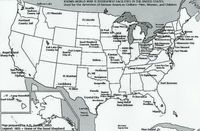
Board #2- German and Italian Internees
Despite Germans and Italians being more integrated into American society, they were also confined. Many of the German POW's were kept in camps and centers in Oklahoma- as close to us as Pryor, Oklahoma and as far away from us as Ft. Sill in Lawton, Oklahoma. German POW camps were located throughout the state including towns like Stringtown, Pryor, McAlester, Muskogee, and other places around the state. There were not nearly as many Germans and Italians confined as there were Japanese.
The internees, especially the Japanese, tried to make life as good as they could while they were interned. They had schools, libraries, jobs, and activities while imprisoned in the camps. They were given small amounts of freedom to decide how they wanted camp life to be. For instance, the Germans were allowed to hold Nazi meetings within the camps. For many though, there were many changes to very personal parts of their lives. As an example, their religious lives. While there was a small population of Christians among Japanese-Americans, most were not. In the camps though, Christian and Catholic priests were brought in to conduct religious services. It was a time of great change and great challenge to people who, for the most part, considered themselves American.
-
Board #1- Public Enemy #1
-
Board #3 - Going Home
-
Challenge Stop #1- The Suitcase Challenge
-
Board #4- Zoot Suit Riots
-
Board #5- The Sleepy Lagoon Murder
-
Challenge #4 - The Forensics Challenge
-
Final Information on the Sleepy Lagoon Murder
-
Board #6- Black Wall Street near Tulsa, Oklahoma
-
Begin Here
-
Challenge Stop #2- Origami Peace Cranes
-
Challenge Stop #3 - Haiku
-
Board #7 - In the End
-
Board #2- German and Italian Internees
-
Challenge #5 - Do You Have Racist Tendencies?
-
Challenge #6- Skin Tone Sorting